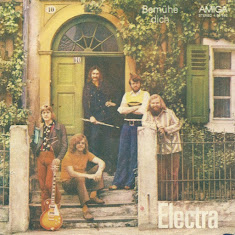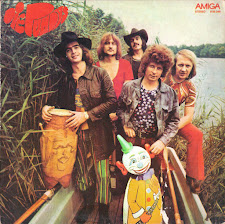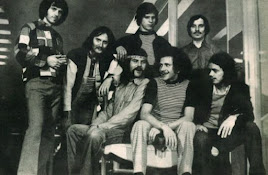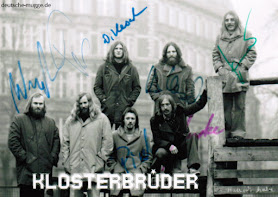 |
| Andromeda |
Andromeda - Return To Exodus (1969)We open with a galloping proto-metallic marvel, as were many Andromeda songs. This is
John Du Cann's adaptation of the theme music from the historical epic "Exodus", starring Paul Newman (youtube:
1 ,
2). This is a great example, like
Holst's "Mars" influencing Black Sabbath, of something older being respected by forward-thinking musicians. According to John, it was played as the encore at shows during the peak of their popularity, which was pretty high at the time. They were playing with bands such as
The New Yardbirds (soon to become
Led Zeppelin), and topping bills with
Black Sabbath.
 |
| From Angel Air's "Definitive Collection" |
Andromeda existed for a short time, up until 1970 when guitarist John Du Cann left to join
Atomic Rooster. The other main members were Ian McLane (drums) and Mick Hawksworth (bass -
Fuzzy Duck,
Ten Years Later). Being something of an early hard rock originator, John is a regular mention on this blog, and was in bands
The Attack,
Hard Stuff,
Atomic Rooster and others that have appeared here. "Exodus" is a non-album track that was first published on
Angel Air's 2-CD "Andromeda Definitive Collection", which has a large number of demos and live tracks which make for a great listen. There is also a good interview with John in that set.
 |
| Fläsket Brinner |
Fläsket Brinner - Räva (1971)Here's a short and sweet wah guitar rocker from a band that otherwise tended towards long jazz prog workouts. Fläsket Brinner was formed in Stockholm in May 1970 by Per Bruun (bass), Bengt Dahlén (guitar), Sten Bergman (organ), Gunnar Bergsten (sax) and Erik Dahlbäck (drums). Several of the members had previously played together in the band Atlantic Ocean. Although they only released two studio albums in the early '70s, the band's first period of activity lasted up until 1981, during which time it appears their preferred work method was playing live on stage and radio.
 |
| Three Man Army |
Three Man Army - Nice One (1971)Here's a funky little number with a guitar tone that sounds good enough to eat, from UK three-piece Three Man Army, who have received a lot of attention on this blog, including the Gurvitz Brothers special volume 125: Race With The Devil (
link). Like Andromeda, Adrian and Paul Gurvitz's previous band
Gun is retrospectively regarded as one of the UK's earliest heavy metal bands, and Three Man Army (with the addition of Mike Kelly & Tony Newman on drums) was the brothers' next band to carry on the hard rock sound, with three studio albums.
 |
Heads Of Our Time
The Subtle Art of Self Destruction |
Heads Of Our Time - Airhed (1970)Here's a curio from Canada, a great fuzzy-riffed groover with a slew of strange sound effects. Heads Of Our Time was the creation of two guys from Toronto R&B Soul band
The Majestics, Jay Jackson and Rick Robertson. The album this is taken from is a mixed bag of covers (Hendrix, Beatles etc) and soul rock with horns. From some reading it seems this may have been some kind of studio-only exploito-disc which was attempting to do a bit of everything and use a load of studio sound effects. There is not much to find about the band but you can read what there is at Citizen Freak (
link).
Here's the the blurb from the back cover:
The knowledge that one begins to die a split second after birth is a cringing scream that echoes throughout your body. And as you breath the poison in the air around you, your expanding mind turns on its originator to begin the cold, calculated destruction of itself. Slave becomes Master and the awesome power of it makes nerve endings quiver and creates a burning desire for a woman with a blank look on her face who will assist you in "The Subtle Art Of Self Destruction".
 |
Sounds Nice
Love At First Sight |
Sounds Nice - Why Do I Do It (1970)When Decca Records A&R man Tony Hall discovered that Serge Gainsbourg’s heavy-breathing hit "
Je T'Aime… Moi Non Plus" had been banned in the UK, he rushed to get together some associates to make a quick cash-in instrumental cover for the UK, which became a minor international hit itself. On the strength of this he arranged the instrumental album "Love At First Sight" using the same musicians. So this was an exploitation record in every sense of the term, and is where track six in this comp comes from. The name "Sounds Nice" was apparently inspired by a passing comment from Paul McCartney at Abbey Road studios where they recorded. Among many working musicians used, Chris Spedding (
Nucleus,
Sharks) played some guitar for the record, and Tim Mycroft (
Rupert's People,
Thursday's Child) was the keyboard player, who was also briefly in the fore-mentioned Gun with the Gurvitz bros. (
link).
 |
| Spring |
Spring - Sprung (1971)Here's a b-side tucked away in the catalogue of Canadian band "Spring". There's some excellent flute in this one and it really gets jamming by the end. They only made a few singles, ranging from 1970-75. They were not a heavy band, on record at least. Polite FM radio-friendly rock was their bag, and possibly the most interesting thing I can find about them on a quick search is that Kat Hendrikse drummed on the first album from
Heart. Another guy who drummed for Spring, Paul Burton, was also in
Painter at one time, who appeared way back in volume 13 of TDATS (
link).
Cat Mother And The All-Night Newsboys - Albion Doo-Wah (1970) Here's a band that originated in Greenwich Village New York, with four albums, all of which have one and precisely one, hard rocking instrumental jam, where the band cuts loose from their usual bar-room country rock, and the results are always great! In chronological order, these tracks are "Track In A" (1969), "Albion Doo-Wah" (1970), "Hebbiejeebies" (1972) and finally "Bottle O'Dog" (1973), on their final LP. Knock yourself out and make a nice little comp of those if you like! Of note, guitarist Charlie Prichard was in Conqueroo, who appeared on TDATS 138 (
link) and the band's first album, "The Street Giveth.. And The Street Taketh Away" was produced by Jimi Hendrix.
Thomas Natschinksi Und Seine Gruppe - Kosmos 354 (1970) Here's a band that I discovered while making the recent TDATS volume based on forgotten bands of post-war communist Germany (
link). Kosmos 354 is a wild freakout of epic proportions which highlights the band's multi-instrumental skills. With that song title, and what sounds like a rocket taking off at the beginning, maybe this is some early DDR space rock? If you know what the lyrics convey feel free to leave a comment! Thomas Natschinski's group started out as successful beat band "Team 4", and made three LPs on the Amiga label. They morphed into a prog band that played a variety of pop to hard rock. Thomas Natschinski later become a music producer for soundtracks of many movies and TV shows, and has a website (
link). More can also be read at deutsche-mugge (
link) and ostmusik (
link).
The Underground Set - Tanto Per Cambiare (1970)Here's a great track from a mysterious Italian library music act, called The Underground Set. I'll say more about this subject in further episodes, Italy produced a lot of remarkably heavy and fantastic music in this vein. A genre unto itself, some of which has already appeared here,
Blue Phantom in volume 20 being one of them (
link).
%20%E2%80%93%20L'int%C3%A9grale%2019691973.jpg) |
| Triangle – L'intégrale 1969/1973 |
Triangle - Fonction Binaire (1971)Coming up now is one of France's first successful progressive rock bands. I listened to a lot of them when concocting the recent (2nd) French volume (
link). This is a previously un-released track which was first included in a 1997 4-CD set called "L'intégrale 1969/1973", which includes all their albums, along with comprehensive singles and bonus track rarities. Triangle produced three solid albums, with many heavy moments and a variety of sounds of largely British influence (
Gentle Giant,
Genesis) which are all done well, and accessibly free of self-indulgence.
 |
| Vita Nova |
Vita Nova - Lacrimosa (Death Of The World) (1971)Here's an absolute head-trip from a German-based band that made one eponymous album, which is now one of the most sought-after Krautrock rarities. The album has a lot of short and reasonably accessible tracks among the more experimental material, with a wide range of styles, instrumentation and percussion. There's a few heavy prog tracks with the kind of jarring riffs and time changes that I like, but "Lacrimosa (Death Of The World)", an un-released bonus track from Garden of Delight's 1995 re-issue, is a brooding instrumental which starts off slowly and ends in a heavy organ wig-out. The keyboard player in question is Serbian Sylvester Levay, who lived in Hollywood later and composed music for Elton John, and the Airwolf theme, one of the best of the "man and machine" TV shows of the '80s, with the best music!
 |
Gipsy Love
Here We Come LP |
Gipsy Love - Moon Song (1972)This is another track draped in heavy atmosphere, with an amazing production quality that really accentuates its ethereal soundscape. This is from an Austrian band that made two albums. Most of their music was very US influenced, so much so you might think they were American just from listening, and this made for an unusual mix of US country flavoured rock with some big band brass section stuff going on too, plus a sprinkling of European prog here and there. The guitarist Harri Stojka was in
Novaks Kapelle, an Austrian band that made some excellent heavy psych singles and has appeared here before. Keyboardist Peter Wolf played for Frank Zappa and became a producer, working on albums from
Starship and
Lou Gramm, and scoring films in the NeverEnding Story and Weekend at Bernie's series. I realised a couple days after posting this that I had used a Gipsy Love track from the previous, eponymous album, in the Austrian TDATS vol 107 (
link).
Iconoclast - The Rock (1973) Here's a ripper of galloping pace with a load of great wah guitar. This is an obscure single on the Counterpart label, which Discogs describes thus: "Founded by WCPO Radio disc jockey Shad O'Shea in 1963, Counterpart released singles aimed at the Ohio-Kentucky-Indiana region, focusing on Cincinnati and Columbus in Ohio; Louisville and Lexington in Kentucky; and Indianapolis and rural parts of Indiana."
"The Rock" is actually the b-side, and in my opinion is superior to the a-side "Hung Up" (thanks to Dan's Garage for the
youtube), which is a lot more upbeat, especially in the vocal department, detracting a little from the heaviness...
Blue Forest - Have You Ever Been There Before (1972) Thanks to Mark, one of the moderators of the TDATS facebook group (
link) for bringing this one to my attention some years ago, and I've been waiting to use it here. This is a Dutch single, which melds melody and hard rock in the addictive way that so many records from The Netherlands do. Blue Forrest include the guitar and bass skills of brothers Hans & Jan Hollestelle, both prolific session musicians and players for bands, some of which have appeared here before such as
Tower (
vol86) and
Sandy Coast (
vol64).
18 Karat Gold - Goldrush (1973) Nearing the end now and here's a nasty cut from an early super-group of the prolific Munich early 1970's scene, fronted by American-German Klaus Ebert. This one has a tense undercurrent that would be great for a movie car chase!
18 Karat Gold had a lot of US country/blues influence with occasional forays into more typical German prog, similarly to Gipsy Love before. All band members at some time played in
Amon Düül II, including Englishman Keith Forsey who played in
Hallelujah (
vol22) and later wrote the Simple Minds hit "Don't You Forget About Me". Also included were two guys from Krautrock name
Embryo, Jörg Evers (guitar) and Lothar Meid (bass).
 |
| Walter Rossi of Charlee |
Charlee - Wizzard (1972)Closing this set is a band that I haven't mentioned since their inclusion way back in 2009's volume 5 (
link) and they certainly deserve more attention now, as Charlee's album is one of the first and best albums I've discovered since going down this obscure rock path. Easily one of Canada's heaviest early '70s albums, Walter Rossi's god-tier blazing guitar skill speaks for itself, with the power of
Leslie West and
Jimmi Hendrix at their peaks. Charlee were a three-piece which surely would be regarded on a level with
Mountain and
Budgie if they had lasted longer.
Walter did continue with a successful career and I have also used solo tracks of his in volume 23 (
link) and volume 105 (
link) but unfortunately for us heavy-heads, this success meant turning to a much more commercial sound, and there really is no other album in his catalogue that matches Charlee for sheer heaviness. Walter, born in
Italy before moving to
Montreal, was at one time in
Luke & The Apostles, a band that comes up frequently in Canada's history of heavy rock, that I have included and mentioned a few times here before, and in the 1960s he played for
Wilson Pickett and the
Buddy Miles Express. Recent sad news came that he died in 2022, but i'm glad to read that he was acknowledged with a number of Canadian music awards (
link), and the rock will live for ever....
Until next time......happy (heavy) listening! Rich
Share via:











%20%E2%80%93%20L'int%C3%A9grale%2019691973.jpg)

































